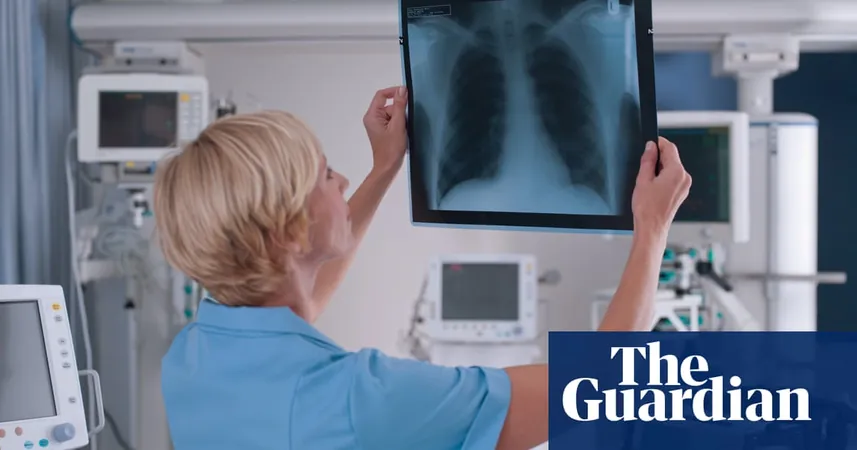
Urgent Call to Empower Lung Cancer Symptom Sufferers in the UK to Self-Refer for Tests
2024-12-27
Author: John Tan
Experts in the UK are urging significant changes in the way lung cancer symptoms are diagnosed, advocating for a system that allows more individuals to self-refer for tests like chest X-rays. This proposed modification could dramatically accelerate diagnosis times and potentially save countless lives, as early detection is critical for successful treatment.
Dr. Stephen Bradley, a lead author of a pivotal study published in the British Journal of General Practice, emphasized the importance of early detection: “A lung cancer diagnosis can be devastating, but spotting it early can make all the difference.” His research points to successful self-request chest X-ray services already operating in regions like Leeds and Greater Manchester, where patients experiencing symptoms — such as persistent cough, fatigue, and breathing difficulties — can access radiology services without needing a GP’s referral. The results of their X-rays are then sent directly to the patient's GP for further evaluation.
This study also sheds light on a concerning trend: those from lower-income backgrounds and smokers are more inclined to utilize these self-referral services. Alarmingly, while the number of patients diagnosed through self-referral sits at approximately 1%, research indicates that this rate is on par with traditional GP referrals, highlighting the appropriateness of this method. As healthcare access continues to pose challenges, the authors, along with the Roy Castle Lung Cancer Foundation, insist on the urgent need to broaden these services.
To improve awareness and prevention, the experts have recommended that outreach efforts specifically target non-smokers, whose symptoms may not be as pronounced as those seen in current or former smokers. “We need to facilitate access for individuals with concerning symptoms and enhance disease awareness across diverse demographics,” Dr. Bradley stated. Given the UK's persistently poor lung cancer outcomes compared to other affluent nations, this message is imperative.
The UK faces a staggering statistic: over 43,000 new lung cancer diagnoses occur annually, with smoking responsible for approximately 70% of cases. However, a noteworthy 14% of those diagnosed have never smoked — a rate that continues to rise as smoking prevalence declines. Early-stage detection significantly increases the likelihood of successful treatment, making timely diagnosis all the more crucial.
In June 2023, the government unveiled plans for a lung cancer screening initiative aimed at individuals aged 55 to 74 who are current or former smokers, set to be accessible throughout England by 2029. However, this initiative will not reach a significant population, as over half of lung cancer cases originate in individuals not fitting the screening criteria, and not all eligible candidates opt to participate.
The experience of Nick Whitehead, a 58-year-old from Newton Aycliffe, underscores these advocacy efforts. After visiting his GP multiple times over 18 months due to a persistent cough, he was never referred for an X-ray. It wasn't until two years later, when he sought emergency treatment for coughing up blood, that he received a lung cancer diagnosis. “There were many opportunities for me to be diagnosed earlier,” he reflected on the missed chances. “Had self-referral been an option, I would have pursued it without hesitation.”
Paula Chadwick, CEO of the Roy Castle Lung Cancer Foundation, echoed these sentiments, stating, “Far too often we hear stories of individuals like Nick whose lung cancer could have been diagnosed sooner. It is imperative to change this narrative and empower patients.” She highlighted the organization's progress, noting that 76% of lung cancers detected are at stages one or two, which greatly enhances treatment success.
A spokesperson for the Department of Health and Social Care confirmed the government’s commitment to reforming NHS functions, stating, “We will combat cancer comprehensively through prevention, diagnosis, treatment, and research.” They pledged to enhance diagnostic services for lung diseases and expand access to multiple healthcare services to catch more cases early.
As the discourse around lung cancer diagnosis evolves, the call for self-referral options and awareness among diverse populations grows louder. With timely interventions, the potential to revolutionize lung cancer outcomes in the UK could be within reach.



 Brasil (PT)
Brasil (PT)
 Canada (EN)
Canada (EN)
 Chile (ES)
Chile (ES)
 España (ES)
España (ES)
 France (FR)
France (FR)
 Hong Kong (EN)
Hong Kong (EN)
 Italia (IT)
Italia (IT)
 日本 (JA)
日本 (JA)
 Magyarország (HU)
Magyarország (HU)
 Norge (NO)
Norge (NO)
 Polska (PL)
Polska (PL)
 Schweiz (DE)
Schweiz (DE)
 Singapore (EN)
Singapore (EN)
 Sverige (SV)
Sverige (SV)
 Suomi (FI)
Suomi (FI)
 Türkiye (TR)
Türkiye (TR)